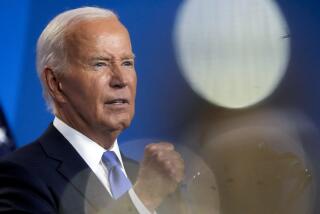Crossroads for Mexico’s PRI
- Share via
The Party of the Institutionalized Revolution, which has dominated Mexico’s political life for 68 years, this weekend will convene its 17th convention. The decisions to be made by Sunday are crucial. They could determine whether the PRI seeks redemption through openness and inclusiveness or remains closed and corrupt, a political dinosaur.
Only if the first course is taken will the PRI be equipped to face the big test ahead: to compete legally and efficiently in the key races of 1997. Six important governorships are up next year, along with every seat in the Chamber of Deputies and 32 Senate seats. Also at stake is the jewel of the crown: the mayoralty of Mexico City, which, for the first time, will be decided in a direct election.
Of all the issues facing the PRI convention, one stands out. Will the delegates be discussing the key to the party’s future, namely a democratic approach to choosing candidates, or will they spend the weekend in assigning guilt for the party’s flagging popularity, pointing at ex-President Carlos Salinas de Gortari and the economic and political debacles of his regime?
A forward-looking view will have to prevail if the “PRIistas” hope to stir political momentum for the party. But there will be those at the Mexico City convention who will argue for business as usual, the continuation of the sectoral spoils system that has guaranteed a set number of candidates from each part of society. For example, the unions--whether of workers, peasants or bureaucrats--traditionally have been allotted candidacies for what amounted to, in the heyday of PRI power, a guaranteed number of seats in both chambers of Congress. That was the system of the dinosaurs, and like its namesake it should be history. Now any member of the PRI should be free to launch a candidacy, with or without the blessing of the bosses.
If the PRI thinks that Mexico has not changed in recent years, it’s in for a nasty electoral surprise.
More to Read
Sign up for Essential California
The most important California stories and recommendations in your inbox every morning.
You may occasionally receive promotional content from the Los Angeles Times.













